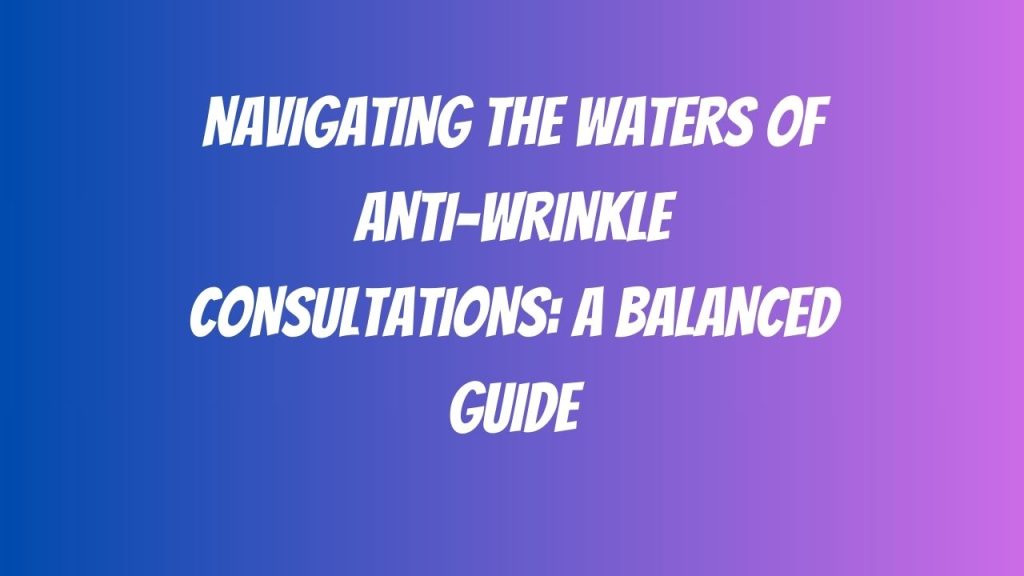Embarking on the journey to find the best anti-wrinkle treatment can feel overwhelming. With so many options available, it’s crucial to approach consultations equipped with the right questions and a clear understanding of what to expect. This blog post aims to guide you through the dos and don’ts of anti-wrinkle consultations, ensuring you make informed decisions about your skincare.
Understanding Anti-Wrinkle Treatments
Before diving into the specifics of consultations, it’s essential to have a basic understanding of the variety of anti-wrinkle treatments available. These range from topical creams to more invasive procedures. Each comes with its own set of potential side effects and risks, and it’s important to recognise that results can vary significantly from person to person.
The Importance of Individual Response
* It cannot be overstated that individual responses to treatments differ.
* One person’s success story does not guarantee a similar outcome for another.
The Dos of Anti-Wrinkle Consultations
When attending a consultation, being prepared is key. Here are some important aspects to consider:
Research
Before your consultation, take the time to research the practitioner’s qualifications and the treatment options they offer. This will help you to ask more informed questions and understand the responses better.
Comprehensive Health Disclosure
* Be open about your medical history, including any allergies, current medications, and past cosmetic treatments.
* This information is vital for assessing your suitability for certain treatments and mitigating risks.
Understanding the Risks
Ensure the practitioner explains all potential side effects and risks associated with the proposed treatment. Remember, it’s important to have a complete picture of what to expect, both during and after the procedure.
Ask About Alternatives
Knowing all your options is crucial. Even if you have a specific treatment in mind, ask about alternatives to ensure you’re making the best choice for your skin and health.
The Don’ts of Anti-Wrinkle Consultations
Just as there are good practices, there are also pitfalls to avoid during your consultation.
Avoid Unrealistic Expectations
It’s important to approach anti-wrinkle treatments with realistic expectations. No procedure can guarantee perfect results, and outcomes can vary widely among individuals.
Not Asking About Aftercare
Failing to inquire about the required aftercare is a common mistake. Understanding the post-treatment process is critical for achieving the best possible results and avoiding complications.
Overlooking the Practitioner’s Experience
Not all practitioners are created equal. It’s crucial to choose someone with extensive experience and a proven track record in delivering safe and effective anti-wrinkle treatments.
Ignoring Your Gut Feeling
If something feels off during the consultation, don’t ignore it. Trust your instincts and consider seeking a second opinion if you have any doubts about the practitioner or the proposed treatment.
In summary, anti-wrinkle consultations require a balance of open-mindedness and caution. Being well-prepared and doing thorough research beforehand can help to ensure that you make an informed decision that is right for your skin and overall health. Remember, it’s essential to weigh both the potential benefits and risks of any treatment, keeping in mind that results cannot be guaranteed and vary from person to person. By following these guidelines, you can navigate the world of anti-wrinkle treatments with confidence and clarity.
FAQs
Accordion Content
It’s helpful to bring a list of your current medications, any known allergies, and a history of past cosmetic treatments. Additionally, having a list of questions or concerns can ensure you cover all bases during the consultation.
Look for practitioners who are registered with a reputable regulatory body and have specific training in cosmetic procedures. Don’t hesitate to ask about their qualifications and experience during the consultation.
While side effects vary depending on the treatment, be sure to discuss the potential for more serious complications with your practitioner. Understanding the risks is crucial before proceeding with any treatment.



